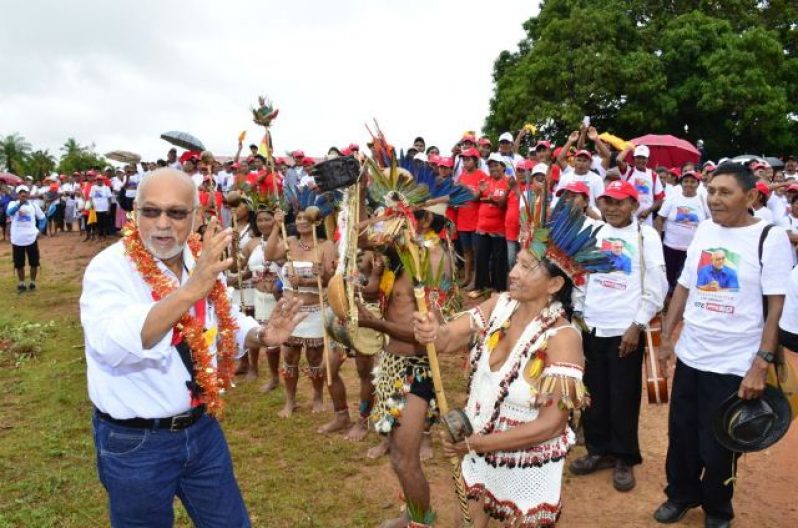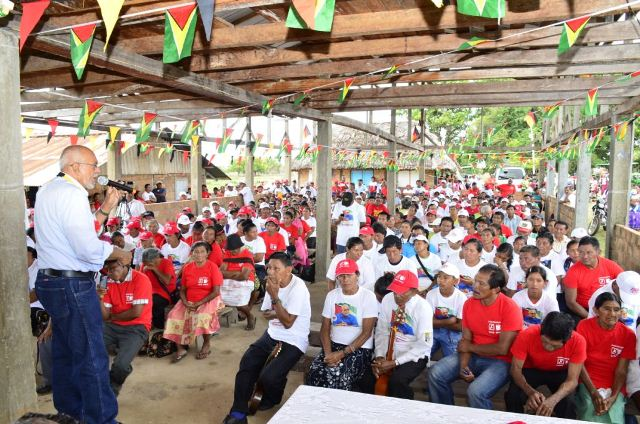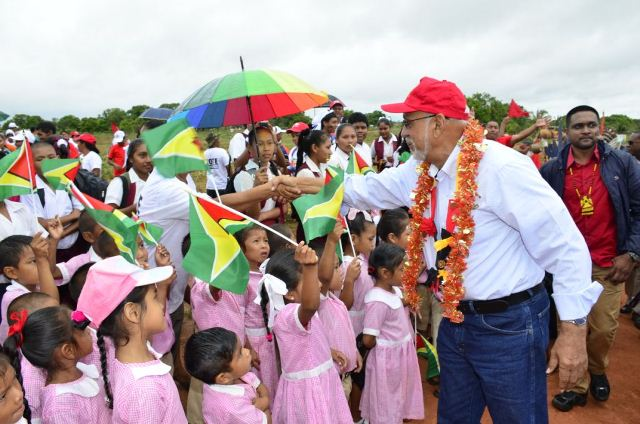HINTERLAND students were yesterday urged to stay in school and pursue every educational opportunity, as education is the tool that will help them capitalise on developmental opportunities, and create enhanced access to a better quality of life.
Those few words of encouragement came from President Donald Ramotar when he visited Aishalton and Potarinau, two communities in the Rupununi, Region Nine.
The President arrived to an enthusiastic welcome from residents dressed in traditional wear. They sang, danced and chanted their support for the incumbent Government’s return to office at the upcoming May 11 elections.
Speaking to the residents later in the community, President Ramotar noted that Guyana’s diversity in its people is an asset and none of the six races is better than another, but there is need to level the playing field for everyone to benefit from development.
“There is no inferior and superior people anywhere in the world; we all have the same brain. It is the opportunities that some of us lack,” he said. The Head of State added that for the first time in years there are more than 30 Amerindian students studying medicine through Government’s assistance, while several others have already been trained and are now based in their communities of birth.
He told the residents that he is aware of the challenges they face in their communities, and noted that the administration is trying to meet the needs of the hinterland population as much as possible to create equal opportunities for every hinterland resident. These efforts, he said, include reducing poverty, pursuing measures to improve people’s quality of life and ensuring there is a highly skilled and educated workforce which will attract more investment to the country and create jobs.
But this highly skilled human capital of which the President spoke, is dependent on citizens capitalising on educational opportunities available, and that is why the administration has been investing heavily in creating access to schools for all hinterland students “because we believe education is key to ending poverty.”
The President recalled when the current administration assumed office in 1992, only 30 percent of the children attending primary schools went on to secondary schools because there was as insufficient number of schools in the country to accommodate them and hence 70 of every hundred children who wrote the secondary schools entrance examination had to remain in primary schools.
Since, then government has built and renovated more than 1000 schools across the country. These include several new schools and dormitories in the hinterland so that the children could have the opportunity to complete secondary school.
The government went further by building hostels in various places and providing food, accommodation, uniforms, text books and cash grants for hinterland students attending secondary school in the capital city.
The President explained that the government made a decision sometime ago to accommodate hinterland school children in secondary schools in the city and only President’s College had dormitory facilities. However, this was met with objection from the political opposition, which accused the government of reducing the standards of the school. President’s College was built under the stewardship of the People’s National Congress’ founder leader, the late President Forbes Burnham.
“We were trying to give the hinterland students an equal opportunity to develop…We were trying to give the people the same opportunity as those on the Coastland, but the PNC said we were trying to break down the standards [of President’s College].”
The President said government stood its ground and persisted. “And a few years ago,” he said, “it was an Amerindian student that topped President’s College. This shows our investment paid off, and we were vindicated. That is why you need to keep your children in school; so that they can be prepared to benefit from new opportunities that are coming.
“I am very happy today that Guyana has the lowest drop-out rate from schools in the Caribbean and the highest enrolment rate of nursery level children. That is why we place so much emphasis on education because no one can take that from you and education develops your capacity.”
While countries endowed with natural resources earn revenues off of these, it is those countries with highly skilled human capital that go on to become developed countries, the Head of State said. However, he agreed that human resources development could be expensive and therefore the government has invested heavily in the social sector, of which education has the largest allocation, “because we believe our people are assets and we want to ensure they have the highest skills possible.”
For this to continue the government requires citizens’ support at the upcoming elections to ensure they return to office and continue the progressive work, he said. He cautioned that the parliamentary opposition has fought these development efforts and over the last three years, they have used their majority seat in the National Assembly to cut the national budget. Among the things affected were the Amerindian Development Fund and monies for the $10,000 “Because We Care” grant. Also threatened were the student loans for those attending the University of Guyana, “and they had an opportunity to vote for it, but instead they cut it and now they want to promise you the moon and the stars.”
He noted that the government restored some of the cuts and that is why the opposition sought to move a no-confidence motion against it. The President said these upcoming elections were prematurely called, but became necessary because the opposition “did not cooperate with us.” Instead they blocked development. He explained that he could have consistently prorogued the parliament and remain in power until the end of the five-year term, but “I am not interested in power for power sake. And that would have affected the development of Guyana.” Hence, the President called early elections, which are less than a month away.
Several Toshaos (village leaders) of the surrounding communities spoke highly of the commitment of the government to the development in their communities. This commitment has seen their communities having access to electricity with the provision of solar panels, All Terrain Vehicles (ATVs), tractors, trailers, minibuses and other forms of transportation, financial support for small businesses, and for the first time ever, Aishalton has a secondary school with accompanying dormitory. (GINA)



.jpg)












